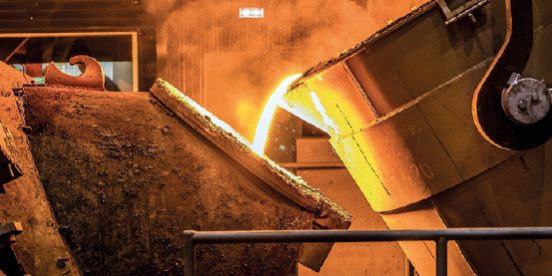by Silvio Stockmann, Member of the Advisory Board of DIHAG Holding GmbH, and
Tobias Romanowsky, Sales Engineer SHB Stahl und Hartgusswerk, Bösdorf GmbH, Leipzig
With Covid-19 and the blockage of the Suez Canal, global supply chains and various manufacturing sectors have been tested on resilience, adaptability, and supply security on an unprecedented scale. Since 24th February 2022, Member States of the European Union and its Atlantic partners face additional supply shortages and a profound energy crisis that threatens national and European security.
Vulnerability around the world
Both crises have exposed the vulnerability of the global supply chains concept, especially if the needs of core manufacturing processes or materials are very distant, located in countries whose national interest is rather opposite to the free west and require time-consuming transportation through disputed or unstable regions or waters for example.
The United States accordingly considers steel to be of national security.[1] The Presidential Directive of former President Barack Obama clearly lists several industries and sectors of importance to national security.[2] Why is that so? Because national security for critical infrastructure and national defence can only be assured through resilient, self-sufficient, and homeland-based supply chains.
In Europe the concept of “national security” needs to be reconsidered as it is forced to rethink and overhaul its national defence and security. Both, however, will only be as strong as its supply chain and manufacturing capabilities which at best are homeland-based. A good example is the German and European iron and steel industry. These industries are imperative to critical infrastructure and other industries because steel is a prerequisite for energy, utilities, defence, agriculture, or infrastructure equipment such as bridges or buildings, railways and carts, mining, and raw materials processing.
A strong and viable domestic steel industry is therefore essential for European security and economic welfare. A further escalation of the war could cut off our supply of steel and iron from overseas and thereby impact our ability to ramp up the requisite production of armaments. The military’s heavier use of domestic sources of steel is arguably the answer to many questions after the supply cuts on raw materials or energy from Russia, Ukraine, China and perhaps Turkey. A continued reliance on steel or iron imported from competitors outside of the EU therefore puts our national security at risk.
Keep core processes of the value chain in Europe
Given the weight of a Leclerc tank, a Howitzer 2000, an aircraft carrier – tons of special steel will be needed, and it will have to be produced safely and independently of Russia or China. It is therefore of utmost importance that the core processes of the value chain remain in Europe, with raw materials and energy being sourced from strategic alliance partners.
In Europe, for example, DIHAG Group, a German based integrated iron and steel group (www.dihag.com), manufactures and supplies components for critical infrastructure such as defence, rail, mining, energy and utilities, and agriculture. One of its subsidiaries, SHB Stahl- und Hartgusswerk Bösdorf GmbH, is specialised in common steel and special alloys for mining, rail, agriculture, dredging, infrastructure, and defence.
Most recently SHB has expanded its capabilities toward cast armour steel. The current development process targets the qualification of grades Q and R for wall thicknesses of 15 and 45 mm by the end of this year with initial range tests documenting superior qualities.
Important criteria for European security
What makes SHB highly eligible for being important to the national security of Germany and the EU, is that the steel foundry is German based, privately owned and has modern, scalable equipment including a metal refining process converter to refine armour steel in high grade and quality. Through the fully automated moulding line for heavy parts combined with dedicated heat treatment lines, SHB has a highly replicable and scalable production process to suit the increased demand for cast armour steel products from European forces.
In addition, the company has a modern engineering department with laboratory, simulation, test furnaces and treatment lines to be a strategic development partner to the Original Equipment Manufacturers (OEMs) of the defence industry. Besides, customers can rely on the group’s broader Research& Development (R&D) capabilities. Accordingly, SHB and DIHAG are strong and viable Tier1 development partners of OEMs in critical infrastructure and defence in Europe and Americas.
[1] See: US Department of Commerce, 2018 https://bit.ly/3ga3Mro
[2] See: Presidential Policy Directive (PPD-21): https://bit.ly/3EK8hDi







